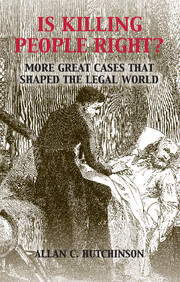Book contents
- Frontmatter
- Dedication
- Contents
- List of figures
- Preface
- 1 Introduction: on the road (again)
- 2 Is killing people right?: law and the end of life
- 3 Oil on troubled waters: the consequences of civil liability
- 4 The politics of law: cats, pigeons and old chestnuts
- 5 The companies we keep: the moralities of business
- 6 Fifty shades of Brown: consent and the criminal law
- 7 Putting up a defence: sex, murder and videotapes
- 8 Wade-ing into controversy: a case of accidental activism
- 9 Playing a different tune: fairness in deal making
- 10 Conclusion: surfing the tides
- Sources
- Index
- References
2 - Is killing people right?: law and the end of life
Published online by Cambridge University Press: 05 May 2016
- Frontmatter
- Dedication
- Contents
- List of figures
- Preface
- 1 Introduction: on the road (again)
- 2 Is killing people right?: law and the end of life
- 3 Oil on troubled waters: the consequences of civil liability
- 4 The politics of law: cats, pigeons and old chestnuts
- 5 The companies we keep: the moralities of business
- 6 Fifty shades of Brown: consent and the criminal law
- 7 Putting up a defence: sex, murder and videotapes
- 8 Wade-ing into controversy: a case of accidental activism
- 9 Playing a different tune: fairness in deal making
- 10 Conclusion: surfing the tides
- Sources
- Index
- References
Summary
The American politician Benjamin Franklin struck a truthful and lasting chord with his declaration that ‘the only certain things in life are death and taxes’. While death is inevitable, its circumstances, timing and details are far from certain or predictable. It can occur at any time and almost by any means. As we manage to live longer and more securely, we have begun to demand greater control over the terms and conditions of our own death and dying; we want to avoid some of the humiliation and pain of a long and debilitating death.
Although it is no longer a criminal offence to commit suicide (even if some do consider it a sin or immoral act), many insist that they should be able to enlist the support of others to bring their life to a dignified and planned close. This, of course, has led to a whole series of moral and legal dilemmas. There is almost no approach or stance that does not receive some substantial support. For every advocate of a liberal policy on physician-assisted euthanasia there is another who condemns such possibilities as demeaning and dehumanising. It is an ethical battlefield of weighty principle and enormous implications that not only matches ethical humanists against religious devotees but also pits those in each camp against each other.
As will come with little surprise to many legal observers and social historians, the courts have been placed front and centre in this social altercation. Judges have been asked to play the role of latter-day Jobs. While the matter had bubbled under the surface for many decades, it is only in recent decades that the issue of whether and, if so, how doctors might be entitled or obliged to end a person's life has forced its way on to the front burner. The right-to-die cases are only one small corner of the wider debate on euthanasia. In the common law, the English courts were confronted by a harrowing set of circumstances in which it had to be decided if the doctors of a young and comatose victim of a monumental sporting disaster could, with his family's agreement, take him off life-support. It was a wrenching decision that placed courts squarely in the public and ethical spotlight.
- Type
- Chapter
- Information
- Is Killing People Right?More Great Cases that Shaped the Legal World, pp. 10 - 26Publisher: Cambridge University PressPrint publication year: 2016



